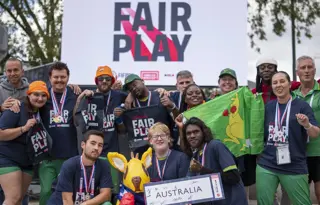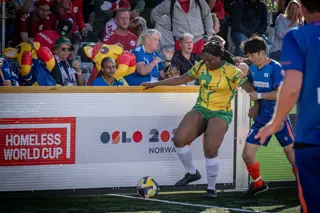News
FIFPRO celebrates spirit of Homeless World Cup with Fair Play Award

- The Homeless World Cup is an annual tournament that uses football as a tool to support and inspire people who are homeless to change their lives
- 498 players from 63 teams and 48 countries competed in the 2025 edition in Oslo, Norway from 23-30 August
- FIFPRO sponsors the tournament’s Fair Play Award, recognising teams’ uplifting sporting spirit that exemplifies the ethos of the tournament
The curtain has closed on another inspiring Homeless World Cup, with the Egyptian men’s team and the Ugandan women’s side lifting their respective trophies for the first time after 498 players competed in Oslo, Norway.
The Homeless World Cup was first introduced in 2003 as a means of bringing a sense of community to the homeless – giving players the tools to make positive changes in their lives and tackle homelessness and social isolation.
FIFPRO, who recently signed a new two-year Memorandum of Understanding with the Homeless World Cup to continue the partnership they officially started in 2015, sponsors the tournament’s Fair Play Award.
The award recognises outstanding sporting spirit and celebrates the spirit of community and hard work.
FIFPRO Fair Play Award Winners
- Day Two: Greece women
- Day Three: The Netherlands (mixed)
- Day Four: South Africa men
- Day Five: Wales women
- Day Six: Uganda women
- Day Seven: Egypt men
- Day Eight: Australia (mixed)

'Winning the Fair Play Award proves I have feelings, I have empathy'
Liesbeth was one of the Dutch team’s players that won the FIFPRO Fair Play Award on Day Three for their sporting spirit in their match against eight-time champions Mexico. Liesbeth, who had a troubled childhood, has beaten drug and alcohol addictions and is having treatment to improve her mental health. She said winning the Fair Play Award was the "cherry on the pie".
She added: "For me, it was already a dream come true to play against Mexico. They are so good and have won so many Homeless World Cups. We knew we were not going to beat them, but winning is not important – playing together is. We were playing well, made five goals and I was so happy to score that I let all my emotions out. It didn’t matter that we lost, it is already an award that we are here."

Talking about the Fair Play Award, Lisabeth said: "All the players here have a backpack with their problems, and they are all trying hard to find solutions. I’ve become much calmer thanks to my trajectory. Winning the Fair Play Award proves that I have feelings, that I have empathy. It was the best thing that could have happened to me, and I had to cry when I heard that we won the award."
'Even when something is not perfect, you can still get something out of it'
In Liesbeth’s final match of the tournament, she faced Australia, that like the Dutch had been winless until that game. The Netherlands won, but the Australian players nevertheless enjoyed every moment and picked up the final FIFPRO Fair Play Award of this year’s event.
"You can only dream about this," said Mish, one of the Australian players. Mish has been homeless and was in a transition home when she joined her country’s street football programme. "Fair play means we have an attitude that is beautiful on and off the pitch. Regardless of the scoreboard, we are all still friends when we leave the pitch."

Mish added: "Our main goal was to execute each match better than the previous one. It is good to have a goal on the pitch, that you don’t have to win to gain something. Against the Netherlands, our win was that we scored four times, which was more than in any other game. Despite losing again, we kept our heads up and kept smiling.
"We’ve learned not to focus on perfection, because if we would have done that, then we would have lost sight of all the wins that we had, and of how much we have grown as a team. Even when something is not perfect, you can still get something out of it."
